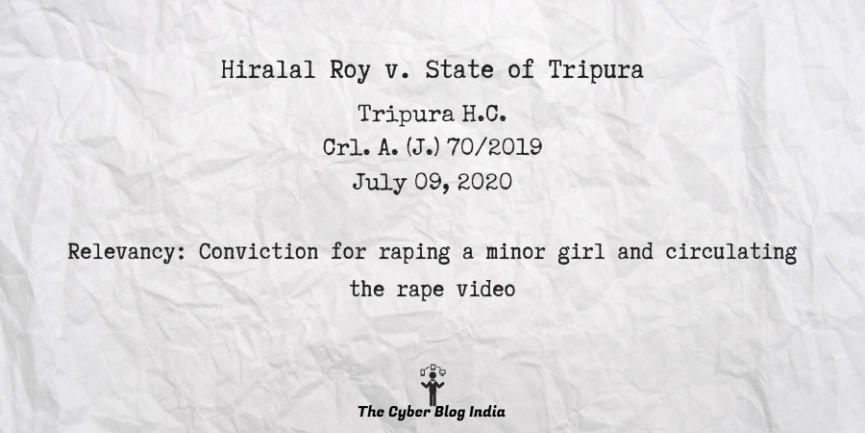Hiralal Roy v. State of Tripura

Hiralal Roy v. State of Tripura
In the High Court of Tripura
Crl. A. (J.) 70/2019
Before Justice S. Talapatra and Justice S.G. Chattopadhyay
Decided on July 09, 2020
Relevancy of the case: Conviction for raping a minor girl and circulating the rape video
Statutes & Provisions Involved
- The Information Technology Act, 2000 (Section 66E, 67B)
- The Indian Penal Code, 1860 (Section 376, 506)
- The Code of Criminal Procedure, 1973 (Section 374, 376)
- The Protection of Children from Sexual Offences Act, 2012 (Section 4)
Relevant Facts of the Case
- The complaint was filed by the victim’s father contending that his 12-year-old daughter had gone to take a bath in the nearby river. While she was coming back home, she was raped by the accused, and the accused had recorded the act on his mobile phone.
- He threatened the girl that if she discloses, he would kill her and her family members. After some time, the obscene video was circulated by the appellant. Soon, the parents of the victim came to know about the incident from their neighbours and confronted the daughter after which she told the truth.
- The learned trial court failed to appreciate the fact that the right to privacy of the victim has been infringed by capturing the image of her private area and transmitting the same to others. The offence under section 66E of the Information Technology Act, 2000 was clearly made out, but the learned trial court framed no charges on this.
- The learned trial court found the appellant guilty of charges under Section 4 of the POCSO Act, 2012 and after conviction, sentenced him to rigorous imprisonment for 10 years and a fine of Rs. 15,000/-.
- Aggrieved by the judgment, the appellant challenged the order and conviction of the trial court before the High Court.
- PW- 12, in his chief examination of the case, has stated that he had procured the video footage containing the rape scene from the mobile seized. On the identification of the same by the victim and the mother, he gave it to PW-11 to get the video transferred to the CD, after which the CD was marked as Exhibit MO1. When the same was put into cross-examination, it was found that the CD was not accompanied by a certificate as required under Section 65B of the Indian Evidence Act, 1872 and hence the same was not taken into consideration.
Prominent Arguments by the Advocates
- Appellant’s counsel:
The age of the victim has not been established and also the medical reports submitted by the doctor does not give a fair picture as the video of the incident was shown to the doctor before the medical examination.
- Respondent’s counsel:
The testimony given by the victim is corroborated by her statement made under section 164(5) of the Code of Criminal Procedure, 1973, and it is clear and consistent.
Opinion of the Bench
- With regards to the contentions raised for the delay in filing the FIR, the reasons have been adequately explained by the prosecution witness that the girl was under persistent threat to be killed by the appellant.
- During her examination in chief, the victim has mentioned that after committing rape, the accused threatened to kill her and her parents.
Final Decision
- Medical examination has unequivocally established the guilt of the appellant. The appellant stands convicted under offence punishable under Section 4 of the POCSO Act, 2012.
Personal Opinion
- This case is a missed opportunity by the court to set a strong precedent for cases where rape videos are uploaded on online platforms. While the investigation officers failed to submit a certificate as required by Section 65B, there is no mention that the law enforcement agency put in any efforts to block or prevent the dissemination of the said video on online platforms.
- Had the CD been brought into the exhibition, the court might have made out offences under Section 66E and Section 67B of the Information Technology Act, 2000.
This case summary is prepared by Shivangi Pandia. She is an undergraduate student at the National Law University, Nagpur.
Disclaimer: Views or opinions expressed in this case summary, whether impliedly or explicitly, are personal.
